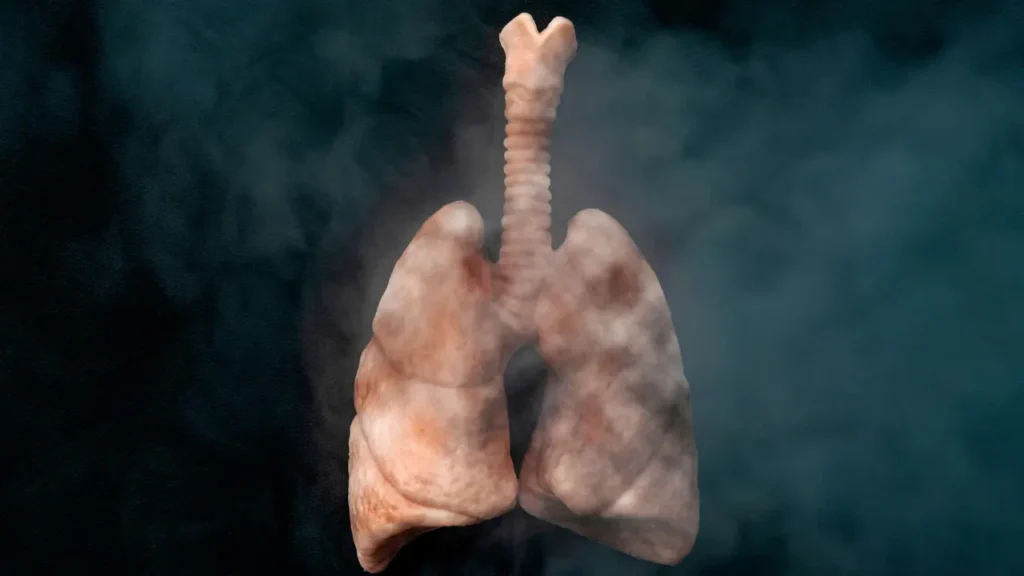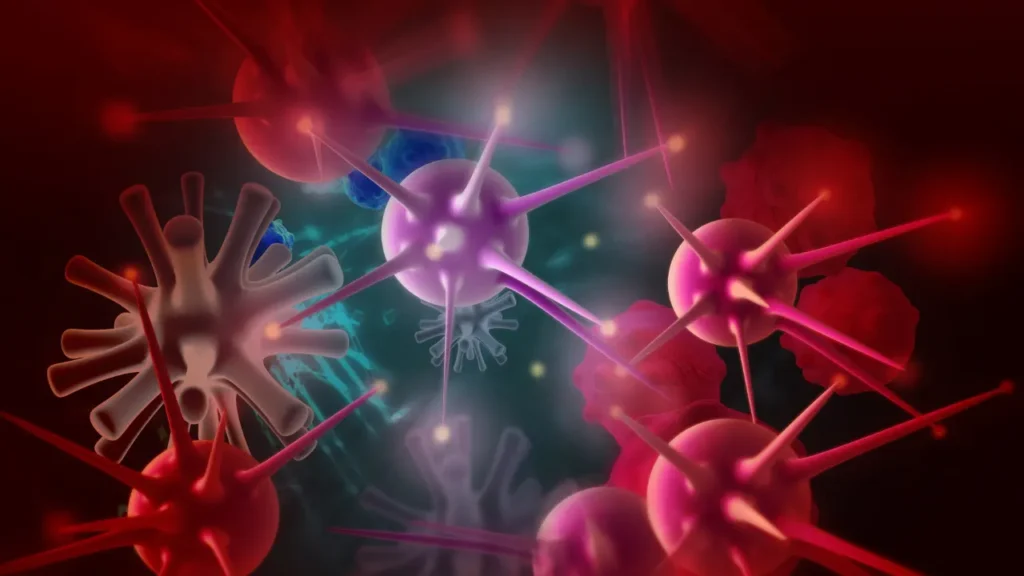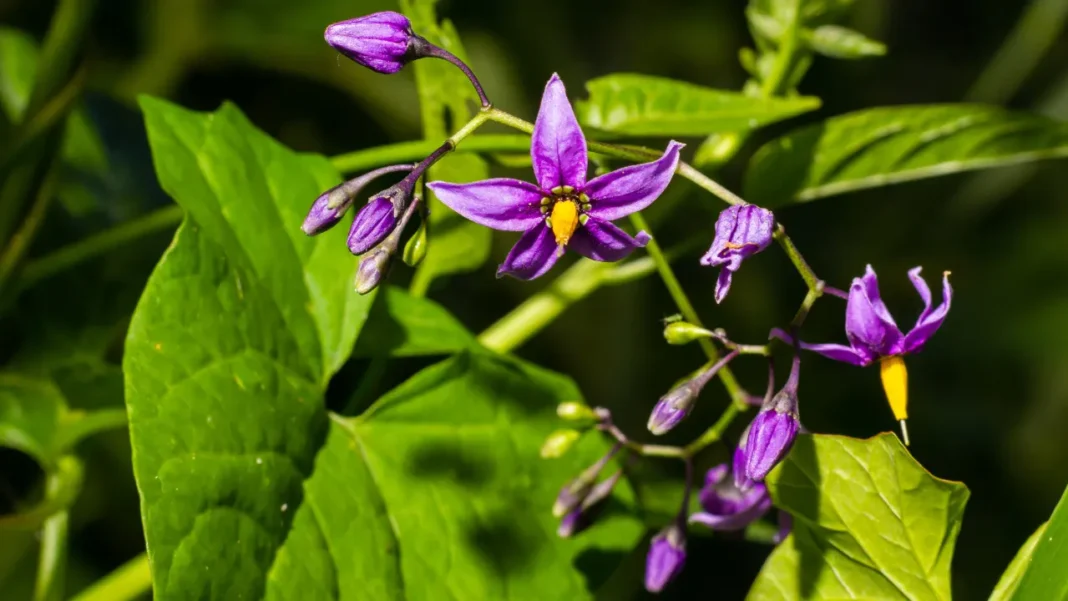The perennial Solanaceae plant, known as bittersweet nightshade (Solanum dulcamara L.), has long been used in traditional medicine for a variety of health advantages. Studies examining bittersweet nightshade’s chemical makeup and pharmacological characteristics have increased in recent years due to the growing scientific interest in the plant’s therapeutic potential. This article thoroughly analyzes bittersweet nightshade, covering its advantages for health, recommended dosage, adverse effects, possible drug interactions, and responsible use as a nutritional supplement.
You May Also Like:
Bryonia: Benefits, Dosage, Side Effects, Drug Interactions, and Other Important Information
Bittersweet Nightshade: Benefits, Dosage, Side Effects, Drug Interactions, And Other Important Information is an original (NootropicsPlanet) article.
Nature of Bittersweet Nightshade
The perennial climbing vine, known as bittersweet nightshade, is distinguished by its purple blossoms, crimson berries, and oval-shaped leaves. The plant was first discovered in Eurasia and has since spread to other continents, including North America. It often thrives in wet environments like marshes, forests, and riverbanks. Bittersweet nightshade is a plant whose stems, leaves, and berries have historically been used in medicine. However, it’s crucial to remember that the plant also contains toxic alkaloids like solanine and solasonine, which can be hazardous if ingested in large quantities.
Pharmacological Properties and Health Benefits
Bittersweet nightshade has a broad spectrum of pharmacological activities due to its complex chemical makeup. The following are some of the plant’s most notable health advantages:
Solanine, a prominent alkaloid found in bittersweet nightshade, has been demonstrated to have potent anti-inflammatory benefits. Solanine was discovered to reduce the production of pro-inflammatory cytokines and inhibit the activation of the NF-B signaling pathway in vitro in a study by Yin et al. (2018).
Antioxidant activity: Bittersweet nightshade flavonoids and phenolic compounds are potent antioxidants that neutralize free radicals and guard against oxidative stress (Wojdyo et al., 2014). Bittersweet nightshade’s antioxidant properties may help defend the body against oxidative stress-related illnesses, including cardiovascular disease and neurological ailments.
Antimicrobial activity: Studies have shown that bittersweet nightshade can fight off several bacteria, fungi, and viruses (Rai et al., 2011). The plant’s alkaloid and phenolic content is chiefly responsible for its antibacterial capabilities, which can prevent the growth and spread of hazardous microbes.
Bittersweet nightshade has demonstrated promise as a possible anticancer drug. Solanine, one of the main alkaloids of bittersweet nightshade, was discovered to cause apoptosis in human lung cancer cells through a mitochondria-mediated route in a study by Lee et al. (2010).

Chemistry of Bittersweet Nightshade
Numerous biologically active substances, including alkaloids, flavonoids, glycosides, and steroidal saponins, are present in bittersweet nightshade. Solanine and solasonine, the plant’s two main bioactive alkaloids, are responsible for many of its pharmacological traits (Friedman, 2006). The medicinal potential of bittersweet nightshade is further influenced by additional ingredients such as coumarins, phenolic acids, and caffeic acid derivatives.
Physiological Mechanisms of Action
Bittersweet nightshade has a broad spectrum of physiological impacts on the human body because of its complex chemical makeup. The plant’s alkaloid, flavonoid, and phenol content, which has a variety of pharmacological qualities, is responsible for the main modes of action. The following list includes several critical physiological mechanisms of action:
- Blocking the signaling mechanisms that promote inflammation: Bittersweet nightshade’s primary alkaloid, solanine, has been found to suppress the nuclear factor kappa B (NF-B) signaling pathway’s activation, which is crucial for controlling immunological and inflammatory responses (Yin et al., 2018). Solanine lowers the production of pro-inflammatory cytokines like interleukin-6 (IL-6) and tumor necrosis factor-alpha (TNF-), which reduces inflammation in the body by inhibiting the NF-B pathway.
- Modulation of oxidative stress: The phenolic compounds and flavonoids in bittersweet nightshade act as potent antioxidants, neutralize reactive oxygen species (ROS) and prevent oxidative damage to cellular structures (Wojdyo et al., 2014). Bittersweet nightshade aids the body’s defense against diseases brought on by oxidative stress by scavenging free radicals and regulating cellular antioxidant defense mechanisms.
- Disruption of microbial growth and proliferation: According to Rai et al. (2011), bittersweet nightshade contains alkaloids and phenols that can interfere with the structural integrity and function of microbial cell membranes, inhibit crucial enzymatic processes, and disrupt the synthesis of nucleic acids in bacteria, fungi, and viruses. These effects all result in the disruption of microbial growth and proliferation. This suppression of microbial growth and proliferation influences the plant’s antibacterial action.
- Cancer cell apoptosis induction: One of bittersweet nightshade’s main alkaloids, solanine, has shown that it can cause cancer cells to undergo apoptosis via a mitochondria-mediated route (Lee et al., 2010). Cancer cells eventually die due to activating pro-apoptotic proteins like Bax and caspases and suppressing anti-apoptotic proteins like Bcl-2.
By understanding the physiological mechanisms of action underlying the plant’s pharmacological properties, researchers can better explore bittersweet nightshade’s potential therapeutic applications and create plans to harness its health benefits while minimizing any possible risks associated with its use.

Optimal Dosage and Administration
There is no standard dosage for bittersweet nightshade as a dietary supplement because there has only been a little scientific research conducted on the plant. The ideal dosage may change depending on parameters, including age, body weight, and medical conditions. According to some research, a daily intake of 100–300 mg of bittersweet nightshade extract, standardized to contain 1-2% solanine, may be beneficial for therapeutic purposes (Ma et al., 2013). Before beginning any supplement regimen, speaking with a healthcare practitioner is essential because individual needs and reactions can differ.
Side Effects and Precautions
Although bittersweet nightshade has a long history of usage in traditional medicine, it is essential to be aware that it contains harmful substances, including solanine and solasonine. Excessive ingestion can result in bittersweet nightshade toxicity symptoms, such as nausea, vomiting, diarrhea, dizziness, headaches, and, in extreme circumstances, respiratory depression and even death (Mensinga et al., 2005). Before using bittersweet nightshade as a nutritional supplement, following the dosage instructions and seeking medical advice is essential. The following are a few possible adverse effects of taking supplements of bittersweet nightshade:
- Digestive problems: Some people who consume bittersweet nightshade may experience mild digestive issues such as gas, bloating, and indigestion.
- Allergic reactions: People who have previously experienced allergies to Solanaceae plants like tomatoes, potatoes, and eggplants may be more prone to experiencing an allergic reaction to bittersweet nightshade.
- Drug interactions: Bittersweet nightshade may increase the risk of bleeding when used in combination with anticoagulants, antiplatelet medicines, and nonsteroidal anti-inflammatory drugs (NSAIDs). Furthermore, the plant may impair the metabolism and absorption of other medications, including antibiotics and antifungal agents, reducing their therapeutic efficacy (Rai et al., 2011).

Potential Substance Interactions
Bittersweet nightshade may interact with several drugs and chemicals, as previously indicated. The most prominent encounters include the following:
- Anticoagulants and antiplatelet medications: According to Rai et al. (2011), bittersweet nightshade may intensify the anticoagulant and antiplatelet effects of medications including warfarin, aspirin, and clopidogrel, hence raising the risk of bleeding.
- NSAIDs: Taking bittersweet nightshade at the same time as NSAIDs like ibuprofen, naproxen, and diclofenac may raise your risk of stomach bleeding and ulcers.
- Antibiotics and antifungal agents: According to Rai et al. (2011), bittersweet nightshade may alter the metabolism and absorption of several antibiotics and antifungal drugs, lowering their therapeutic efficacy.
Best Responsible Uses of Bittersweet Nightshade as a Nutritional Supplement
Consider the following suggestions to guarantee the proper and safe use of bittersweet nightshade as a dietary supplement:
- Before beginning any supplement program, speak with a medical professional, especially if you have any pre-existing problems, are pregnant or nursing, or are taking any drugs that might interfere with bittersweet nightshade.
- Follow the stated dosage and administration instructions since bittersweet nightshade overuse can result in toxic symptoms and serious adverse effects.
- Pay attention to how your body reacts to bittersweet nightshade supplements, and stop taking them if you have any unfavorable responses or allergies.
- To guarantee product security and effectiveness, get bittersweet nightshade supplements of the highest caliber from reliable suppliers. Look for goods that have undergone independent testing to ensure purity, potency, and the lack of contaminants.
Bittersweet Nightshade:
Conclusion
While bittersweet nightshade has been historically used in traditional medicine, it is crucial to approach it with caution due to its toxic nature. The potential risks associated with ingesting or topical application of bittersweet nightshade outweigh any perceived benefits. If you are considering using bittersweet nightshade for medicinal purposes, it is highly recommended to consult with a qualified healthcare professional who can provide guidance based on your individual health status and potential risks associated with this plant. It’s also important to know that the plant is not recommended for self-administration due to its toxicity.

References:
- Solanine: A Natural Inhibitor of Pro-inflammatory Signaling Pathways. Retrieved from: https://www.frontiersin.org/articles/10.3389/fphar.2018.01475/full
- Steroidal Glycoalkaloid Solamargine Induces Apoptosis in Human Hepatocellular Carcinoma Cells. Retrieved from: https://www.jstage.jst.go.jp/article/bpb/33/6/33_6_945/_article
- Glycoalkaloids in potatoes: The effect of variety and drought stress on the alpha-solanine and alpha-chaconine contents of potatoes. Retrieved from: https://pubmed.ncbi.nlm.nih.gov/15998118/
Important Note: The information contained in this article is for general informational purposes only, and should not be construed as health or medical advice, nor is it intended to diagnose, prevent, treat, or cure any disease or health condition. Before embarking on any diet, fitness regimen, or program of nutritional supplementation, it is advisable to consult your healthcare professional in order to determine its safety and probable efficacy in terms of your individual state of health.
Regarding Nutritional Supplements Or Other Non-Prescription Health Products: If any nutritional supplements or other non-prescription health products are mentioned in the foregoing article, any claims or statements made about them have not been evaluated by the U.S. Food and Drug Administration, and such nutritional supplements or other health products are not intended to diagnose, treat, cure, or prevent any disease.



